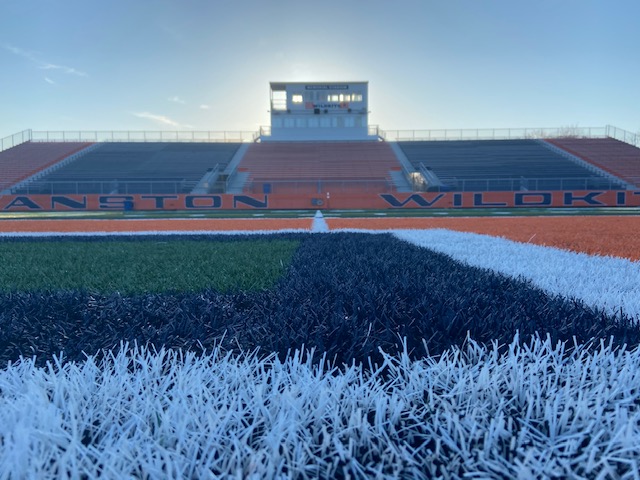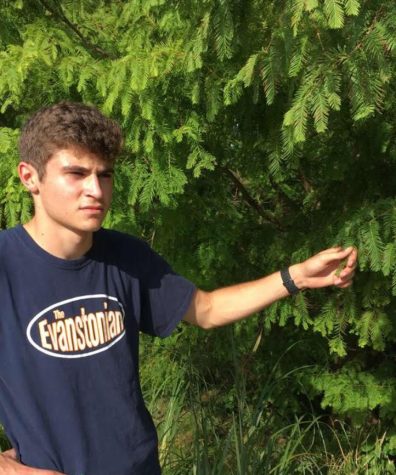A deep dive into how COVID-19 impacts senior athletes
Lazier Field is empty following the statewide stay-at-home order that has cut short or cancelled many senior Wildkits’ seasons.
April 6, 2020
On March 12, our lives were put on hold. This was of course the day in which the email detailing the ETHS building’s closing and the school’s transition into e-learning was sent out in wake of the ever growing COVID-19.
While some were initially overjoyed with the idea of not having to go to school, others were heartbroken. Every spring athlete will be missing a majority of their season, and potentially the entirety of it. For seniors, their last spring around a team and sport they have grown to love is in jeopardy.
“They’re potentially losing out on an experience that they’ve been looking forward to their whole lives,” Athletic Director Chris Livatino said. “They are heroes in some ways, because they had to sacrifice and give up something that meant an awful lot to them so that we could be a safer society and community.”
The IHSA is targeting a May 1 return, and says a return in early May would create a plausible state tournament in June. However, the unpredictability of this pandemic means nobody can be sure if activities will resume.
The IHSA, as well the entire population, finds themselves wading in uncharted waters. Few times in history has the whole world had to deal with a crisis of this scale. One of the few parallels Livatino sees with today’s athletes would be the 1980 United States Summer Olympics Teams.
In 1980, President Jimmy Carter announced the U.S. would be boycotting the olympic games. Although the athletes had been training for years, waiting for their once in a lifetime opportunity, their chance was taken away as Carter wanted to stand up for Afghanistan while the games were being held in Russia.
“Those athletes are some of the few exceptions of people that can actually identify with what’s going on. It’s no fault or control of their own, they were expected to have this incredible opportunity, and then boom, our government decides to send a message to try and help the people of Afghanistan, and we’re going to pull out of the games,” Livatino explained.
Despite the lack of experience, Livatino and strength coach Mark Feldner acknowledge the potential for growth during this time as they have as they have encouraged athletes into staying ready for a return.
“I’ve said that this can actually be seen as a great opportunity for them to train and grow and develop athletically and physically. [Feldner] has put together a pretty comprehensive series of workouts everyday with five different types of workouts you can do each day,” Livatino said.
While Livatino is encouraging student athletes to maximize their productivity, he and coaches are also making sure they feel supported through this frightening time.
“Take care of your teammates, call, don’t just text them. Try and pick up a phone and talk to them,” Livatino said. “If you notice there’s anything wrong with anybody emotionally or financially, share that immediately with either myself, the social workers or the school in general, so we can try and get them the help they need.”
Student athletes’ reactions
It’s difficult to describe the emotions felt by all senior athletes with words. While every student athlete has their own feelings about the situation, there was a recurring message of devastation and shock.
“It didn’t feel real for the first few days. I did have a lot of hope at the beginning that we would be able to come back, but that’s slowly fading,” senior lacrosse player Jack Sload said.
The surreal feeling is certainly understandable. After all, teams were preparing for months prior to the season’s start, just to learn of its cancellation days before their first game. For girls water polo, the news was broken just after their first game, still at ETHS, where they defeated Whitney Young 11-2 in the Burton Aquatic Center.
“I remember it really well because our whole team was together. Our first game was the night that they sent the email saying we were done until further notice. It was a really weird feeling, because we had just played our first game; it was heartbreaking,” senior Laurel O’Hare said. “We all knew before our coach even found out. We were all just standing on deck and had no idea what to say. We were all shocked and didn’t believe it was real.”
While the girls water polo team heard the news after their first game, most other teams affected were spring sports who were preparing for their season to start. The lone outlier of the bunch was the boys basketball team.
The boys basketball team was preparing for their sectional final game against Loyola when the news broke the day before the scheduled tip-off. In the hours leading up to the cancellation, the IHSA said games would be played without fans, as teams would be limited to 60 spectators that consisted of family and media. However, as details of more and more cases of COVID-19 in Illinois were released, the IHSA made the safe decision to cancel the remaining games and postpone the spring season.
“For me personally I didn’t think it was real, I thought it was a joke and so did everybody else on the team,” senior basketball player Devaughn Bell said. “We all asked our coach, and he confirmed it. We were all just devastated and couldn’t believe it.”
As the shock has simmered down and reality has just begun kicking in, it’s a hard pill to swallow for seniors to know that their final season in orange and blue may be over without even starting.
“We’ve all been looking forward to [this year] since the end of last season,” senior Chyne Temple of boys volleyball explained. “Not having that final year, it sucks.”
During the summer, fall and winter, spring athletes have not only been eagerly awaiting the return to their beloved game but have also been putting in countless hours of preparation.
“We all worked really hard in the off-season and had high hopes for this season. It felt sad during practice that Friday morning knowing it could very well be my last,” boys water polo player senior Ben Coleman said.
Although the IHSA hopes the season will be played, many athletes at ETHS are pessimistic about the likelihood of a spring season.
“In terms of our season, me and my teammates are pretty sure that the season will be canceled especially since they canceled NCAA championships,” senior Drew Patterson of girls track explained.
With disappointment filling the air, many student athletes are also acknowledging how although it was devastating, it was the choice that needed to be made.
“I worked hard on my game during the off season and finding this out made me feel like it was for nothing,” senior boys tennis player Georges Durand said. “I wasn’t really that upset though, because I knew it was for a good cause.”
Like Durand, Monica Hill, a senior of ETHS’ badminton team, shared her reaction of not only her season ending, but the effects of COVID-19 itself.
“[The season ending] made me really worried, because it made me start to grasp how serious the virus was becoming. It was also very upsetting to hear because it’s my last year, and so many seniors’ last year and our team had so much potential,” Hill said.
As a whole, all athletes have processed the postponement of their season in a different way, and every athlete’s individual thoughts and feelings on their season ending varies from each of their teammates. However, it is safe to say that all athletes feel some type of sorrow when thinking about their season being put on pause.
How athletes have responded
Despite an unknown future, athletes have continued to practice and train in any way they can in hopes of being called back onto the field.
“Now that it’s cancelled, the mindset switches to ‘keep preparing in case we have games.’ There’s nothing you can do but prepare for whatever season you may have,” senior baseball player Noah Leib said.
This routine can be easier to replicate for some. Sports that require more equipment such as baseball and water polo have had to make a greater deal of adjustments. For sports such as track, one just needs a pair of shoes and a road.
“I still am in contact with the team and checking up to see if they are doing work as well as working out myself,” senior runner Sacrad Michelin explained. “I’ve been taking the workouts I usually do and just do them without a track, instead just running down my street.”
With all gyms in the area closed, creating at-home workouts are a priority.
“It’s tough to go from intense offseason workouts to not even having the YMCA open. I’ve been doing my best to do push-ups and just keep some strength and power,” Leib said.
Every athlete knows that physical health is only half of the practicing. Staying mentally prepared to suddenly come back to a season is a daunting task, so staying in the right mindframe through watching film has become a necessity.
“Unfortunately, it’s getting harder to play with all the fields in Evanston being policed,” senior soccer player Callista O’Connor explained. “Our coaches have been checking in with us and making us watch and analyze film.”
Isolating oneself is a recipe for team failure. Even if teammates are unable to build a physical connection through practices, working to maintain an emotional connection can help lead to success on the field, according to some coaches and athletes. Many teams have tried to continue building team connections through social media accounts and video calls.
“Recently, we did a rock-paper-scissors competition against the varsity softball team over Zoom which was super fun,” senior lacrosse player Julia English said. “I think as a team, we’ve stayed super close, making sure each of us does our part at home.”
Lessons learned
Despite the universal feeling of devastation towards potentially losing their final season as a Wildkit, a number of athletes have chosen to see the silver lining of learning that nothing is guaranteed.
“If you have already played your last game, don’t you wish you would have played that last game a little harder? We all thought we were going to have a senior season, and while we still might, it’s not what any of us would have expected. You can’t take anything for granted,” Leib explained. “No matter how guaranteed something seems, there can always be an international pandemic.”
While initially some athletes had deflated reactions to hearing about IHSA’s decision to partially cancel the spring season, students such as senior softball player Molly Chambers recognize the gravity of the current situation.
“Ultimately, I believe the IHSA is doing the right thing, but I think it’s an extremely tough pill to swallow,” Chambers said. “As much as I want to play, I think that public safety is priority number one, and I want to ensure that by playing we aren’t putting our community at risk.”
COVID-19 has caused thousands of deaths and millions to go unemployed around the globe. While some would expect an 18-year-old to be unable to see the bigger picture, students have done just that.
“With all the people who don’t have an income and are sick and dying because of this, it’s important to take a step back and say ‘my senior baseball season is not what’s important right now,’” Leib said.
If students are able to keep the same mentality as Chambers and Leib and practice social distancing, there is a chance they will get part of their season back — a chance to have a slice of what they dreamed their senior season to be and a moment to shine in their final days as a Wildkit.











